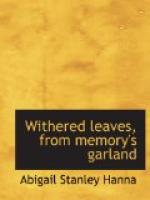It was painful to Henriette to witness the cringing servility of many who formerly treated her with contempt; but she had learned many useful lessons in poverty, that affluence never would have taught her, and she ever endeavored to throw the sweet garb of charity over the frailties of her fellow men, and especially did the destitute orphan ever find sympathy and assistance from her generous aid. Fleeting years have borne away many of the actors in this little drama, and the grass grows green upon their graves. Other eyes have learned to look upon the mountains, and trace ideal imagery upon their shadowy sides. Little feet imprint the terraced walk to the winding banks of the blue Juniata, and watch the bubbles that float upon the stream. No change had passed upon the silver bosom of the waters.
Henriette is happy in the dear old home. Her old nurse is the nurse of her children. A manly form is by her side; tender words are spoken in a deep-toned voice; but it is the husband of her youth instead of the father of her childhood. Happy in the affections of her husband and children, and in the faithful performance of those sweet duties that devolve upon her as a wife and mother, Henriette spends her useful life in the exercise of those virtues she only learned from reverses in fortune. Henry too is happy. Disgusted with flattering attentions paid to wealth, he had won him a name and a bride, while his circumstances were unknown. He had watched unobserved the patient endurance and unwavering industry of Henriette Clinton, and resolved they should not go unrewarded.
The smile of heaven rests upon the happy household, and it is invoked by the voice of ardent prayer, and the family kneel together around the family altar, and the rich, deep-toned voice of Henry offers up the morning and evening sacrifice, rendering praise and thanksgiving to the giver of every good and perfect gift.
The Child.
Laughing child of the noble brow,
Whither, say, whither comest thou?
I’ve been wandering long in sunlit
bow’rs,
Chasing butterflies and flow’rs;
And this bright garland round my hair,
Is one that I’ve been twining there.
Happy child of the garland gay,
Whither wanderest thou to play?
I’ve been floating bubbles on silver
streams:
Printing the sand with golden dreams;
I’ve wandered widely all the day,
And feel much wearied with my play.
Gentle child of the languid brow,
What is this comes o’er thee now?
My wearied limbs are filled with pain,
A scorching fever burns my brain;
Hope dances not before my eyes,
But only points beyond the skies.
Wasted child of the marble brow,
Mysterious death steals o’er thee
now.
How pale and ghastly is thy cheek,
Thy quiv’ring lips refuse to speak;
Fluttering and pausing comes thy breath:—
It ceases now, thou ’rt cold in
death.




